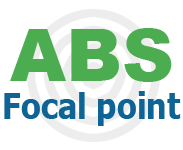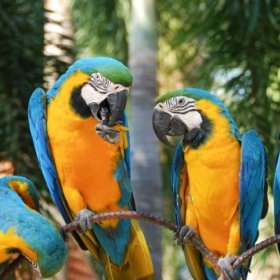|
|
[For the Dutch version, see the ABS Focal Point website.] Welcome to the seventh ABS Focal Point newsletter! In the past few months, a number of international meetings took place where ABS was discussed. In this newsletter we report on progress made in the international discussion about digital sequence information (DSI) and ABS, take a closer look at alien species, biocontrol organisms and organisms associated with genetic resources in the context of the EU ABS Regulation and highlight social media accounts that share information on ABS. This newsletter contains:
|
|
Progress on Digital Sequence Information (DSI)Last month, important international discussions took place about Digital Sequence Information (DSI) on genetic resources. In the process leading to the Fifteenth Meeting of the Conference of the Parties to the Convention on Biological Diversity (CBD), the Third Meeting of the Open-ended Working Group on the Post-2020 Global Biodiversity Framework was held from 23 August to 3 September 2021. As previously explained, an international discussion is currently taking place on whether the utilisation of DSI on genetic resources should be subject to Access and Benefit-Sharing (ABS) obligations, and various policy options on possible ways to deal with access to and benefit-sharing from the utilisation of DSI have been developed. See the previous articles on DSI: Digital Sequence Information (DSI) on genetic resources and Policy options for Access and Benefit-Sharing (ABS) and Digital Sequence Information. Third Meeting of the Open-ended Working Group During the Third Meeting of the Open-ended Working Group (OEWG-3), which was held online because of the COVID-19 pandemic, no negotiations took place, but Parties to the CBD and observers exchanged their views on access to and benefit-sharing from the utilisation of DSI. These views diverged widely, ranging from applying the same ABS rules to DSI as to genetic resources, to no monetary benefit-sharing arising from the utilisation of DSI. The EU and its Member States stressed that the principle of "open access" to DSI must be preserved, and thus any possible future solution for DSI should not lead to hindering open access to DSI nor negatively affect the open science model. Although many other Parties and stakeholders also recognised the importance of open access to DSI, the views on what open access actually means appeared to diverge. Furthermore, according to the EU and its Member States, any potential solution for DSI should be practical, easily implementable, efficient and cost-effective, should ensure that the shared benefits will contribute to the conservation and sustainable use of biodiversity (thereby also supporting the Sustainable Development Goals), must ensure legal certainty, should be ‘future-proof’ (to allow technological developments to be addressed), and should be adaptable to the requirements of other ABS instruments, including possible future instruments. DSI negotiations and policy options Negotiations on DSI are planned to start during the resumed, physical session of the OEWG-3 in Geneva in January 2022. In the period between September 2021 and January 2022, possible policy approaches, options or modalities on how to deal with access to and benefit-sharing from DSI will be further analysed, especially the policy options formulated by the CBD:
An informal advisory group will be established to support this work and other preparations for the Geneva meeting. Furthermore, Parties to the CBD and other stakeholders have been invited to submit their views and new or additional approaches, options or modalities on how to address digital sequence information on genetic resources (until 30 September). The results of the Geneva meeting will be discussed during the Fifteenth meeting of the Conference of the Parties to the CBD (COP-15), which, after a formal virtual opening in October 2021, will mainly take place as a physical meeting in Kunming, China, from 25 April to 8 May 2022. It is expected that decisions on DSI will be made during this Fifteenth meeting of the Conference of the Parties to the CBD. In the meantime, the Dutch ABS Competent National Authority (Ms Kim van Seeters; k.vanseeters@minlnv.nl) remains interested in hearing the experiences of Dutch stakeholders with DSI and their opinions on the DSI policy options.
|
|
EU ABS Regulation: alien species, biocontrol organisms and associated organismsEarlier this year, the European Commission published a revised Guidance document on the EU ABS Regulation (Regulation (EU) 511/2014) which provides more information on the scope and user obligations of the Regulation. In this article we highlight two topics regarding the scope: alien species and biocontrol organisms, and associated organisms.
Alien species and biocontrol organisms Alien species may be in scope of the EU ABS Regulation whether or not they may become invasive, and whether or not they were introduced to the environment intentionally or unintentionally. Once alien species have established in a country (i.e. they are self-sustaining in the wild), they are considered as occurring in in situ conditions in that country. The country where access from in situ conditions takes place is the provider country whose rules should be followed, even if the species is not native to that country. The same is the case for released biocontrol organisms when they are established in the country where they were released. For more information, consult sections 2.1.4 and 2.1.5 of the Guidance.
Associated organisms on an (accessed) genetic resource For more information, consult section 2.3.1.6 of the Guidance. |
|
ABS on social mediaAs more and more information about ABS becomes available, social media are playing an increasing role in sharing news and relevant information for users of genetic resources. Which social media accounts could be useful for you?
ABS Focal Point on social media
News and resources The ABS Capacity Development Initiative supports ABS negotiations and the implementation of the Nagoya Protocol by integrating ABS principles, sustainable use and ethical sourcing into biotrade value chains. On Twitter (@ABSBiotrade), they frequently share events, articles and interviews that highlight how ABS can contribute to sustainability and biodiversity.
Public discussion group |
|

